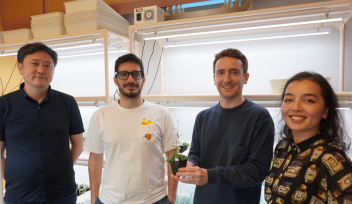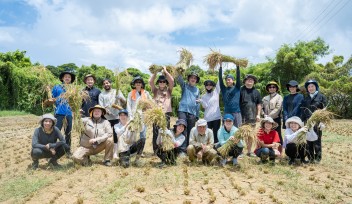Developing glowing sentinel plants to monitor crops in real time to help tackle food shortages

The research proposal “A bioengineering platform for creating agriculturally applicable sentinel plants,” proposed by Prof. Fyodor Kondrashov, who leads the Evolutionary and Synthetic Biology at the Okinawa Institute of Science Technology (OIST), has been selected for the ASPIRE (Adopting Sustainable Partnerships for Innovative Research Ecosystem) 2024 “Japan-UK Engineering Biology.” This is the first time that an OIST research project has been selected for ASPIRE.
The Japan Science and Technology Agency (JST) is aiming to increase the participation of Japanese researchers in international joint research initiatives that are important from a societal perspective. Based on an agreement with the Biotechnology and Biological Sciences Research Council (BBSRC), which is affiliated with UK Research and Innovation (UKRI), the ASPIRE Japan-UK Engineering Biology focuses on creating biological and cross-cutting technologies, and on supporting the development of the next generation of young researchers by building personal networks through internationally competitive joint research projects between Japan and the UK. According to JST, 30 applications were received for this call for proposals, five of which were selected.
Prof. Kondrashov's proposal, “A bioengineering platform for creating agriculturally applicable sentinel plants,” involves Dr. Karen Sarkisyan, Honorary Senior Lecturer at the Institute of Clinical Sciences, Imperial College London, as well as Prof. Hidetoshi Saze, the head of the Plant Epigenetics Unit at OIST. The interdisciplinary research team, consisting of scientists with expertise in machine learning, molecular engineering, and plant science, aims to develop agriculturally useful sentinel plants.
Bioengineering technologies are becoming increasingly important in addressing the global issue of food shortages. One promising technology is luminescent crops that can detect and report pest damage in real time. Specifically, the research team plans to develop tobacco and Arabidopsis plants with new luminescent reporters that light up in response to plant hormones released in response to pests and pathogens, as well as rice and soybean plants that detect crop damage in real time at farms.
Prof. Kondrashov is optimistic, saying that “with these developments, we hope that it will be possible to monitor pest damage in real time by detecting plant luminescence with drones. We also aim to expand our research network further by holding international conferences that bring together researchers from Japan and overseas.”
Prof. Saze, who is involved in this project from the perspective of plant epigenetics, said that “I am happy to be involved in the first ASPIRE research at OIST, and I’m very excited that the ASPIRE research network is addressing global food issues with cutting-edge technology.”
For press enquiries:
Press Inquiry Form














